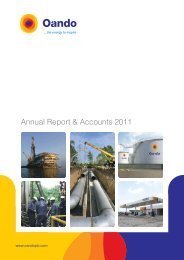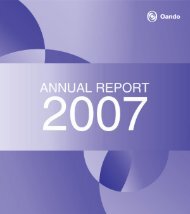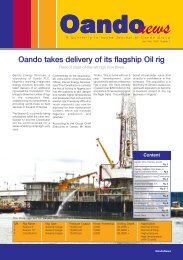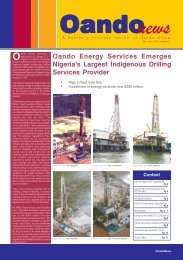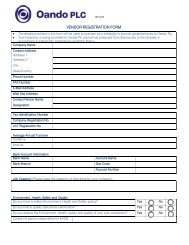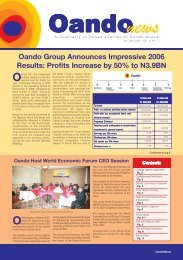Oando Showcases Upstr Oando Showcases Upstream ... - Oando PLC
Oando Showcases Upstr Oando Showcases Upstream ... - Oando PLC
Oando Showcases Upstr Oando Showcases Upstream ... - Oando PLC
Create successful ePaper yourself
Turn your PDF publications into a flip-book with our unique Google optimized e-Paper software.
Gas & Power<br />
Natural Gas utilisation has<br />
globally been accepted as<br />
the most environment<br />
friendly energy source even though<br />
the level of consumption is still very<br />
low in Nigeria. The choice of natural<br />
gas as the cheapest and best<br />
alternative to liquid fuel became an<br />
issue after the Kyoto Treaty of 1996<br />
as a strategy to reduce pollution of<br />
the environment and global<br />
warming from burning of liquid fuel<br />
especially by automobiles and<br />
generators of manufacturers.<br />
According to a study conducted by<br />
the Nigerian Gas Association<br />
(NGA), the use of natural gas will<br />
enable the user to save 30 per cent<br />
of cost compared with the low pour<br />
fuel oil (LPFO), the cheapest liquid<br />
fuel. However, after over a decade,<br />
Nigerians are yet to come to terms<br />
with the benefits of using natural gas<br />
and this is why the Federal<br />
Government continues to budget<br />
billions of naira annually to subsidise<br />
the consumption of liquid fuel, a<br />
major catalyst of environmental<br />
pollution. For instance, in the first<br />
budget appropriation bill for 2008<br />
submitted to the National Assembly,<br />
President Umaru Yar’Adua had<br />
proposed an expenditure of N400<br />
billion as fuel subsidy but was forced<br />
to raise it to N500 billion during the<br />
final review of the budget when the<br />
prices of crude oil passed the $100<br />
per barrel benchmark in December<br />
2007. Even though the subsidy is<br />
designed mainly for premium motor<br />
spirit (PMS) and kerosene, the<br />
plans by the government to include<br />
subsidy of diesel under the<br />
petroleum support fund (PSF) in<br />
response to protests by the National<br />
Union of Petroleum and Natural Gas<br />
(Nupeng ) and National Association<br />
of Road Transport Owners (Narto)<br />
is likely to exceed N1 trillion<br />
according to the estimate of Mr.<br />
Odein Ajumogobia, minister of state<br />
for Energy (Petroleum). Also in a<br />
survey conducted recently by The<br />
Economy, it was estimated that<br />
Nigerian banks spent N54.3 billion<br />
on the utilization of diesel for<br />
generating electricity in 2007. In<br />
Nigeria today, several companies<br />
are relocating their plants from<br />
Nigeria to neigbouring countries in<br />
Natural Natural Gas Gas as as Alter Alternative Alter native Fuel<br />
Fuel<br />
order to take advantage of the<br />
cheaper source of energy since<br />
power supply in Nigeria is not<br />
reliable and cost of using diesel has<br />
wiped off their profits.<br />
A A better better envir envir environment<br />
envir environment<br />
onment<br />
In addition to the perceived<br />
economic benefits of using natural<br />
gas, the real gains may be<br />
environmental. The study<br />
conducted by the West African Gas<br />
Pipelines (WAGPP) concluded that<br />
greenhouse gas emissions in<br />
Nigeria would fall by 78 million tones<br />
(T) over a twenty-year period as gas<br />
flaring is reduced. In this case,<br />
unrests in the Niger Delta will also<br />
become a thing of the past by the<br />
time oil firms operating in the region<br />
put their natural gas into economic<br />
use whereby jobs would be created<br />
for the unemployed youths and<br />
farmers can get produce from their<br />
farmlands when rays of fire from<br />
flaring stopped. Nigerian now burns<br />
off about 2 billion cubic feet (bcf) of<br />
gas per day, which constitutes<br />
roughly 75 per cent of the country’s<br />
total gas output, and is a major<br />
source of carbon dioxide and<br />
methane emissions in the region.<br />
Nigeria has an estimated 182 trillion<br />
cubic feet (tcf) of proven natural gas<br />
reserves, the tenth largest in the<br />
world.<br />
Gover Government’<br />
Gover Gover nment’ nment’s nment’ s support<br />
support<br />
The creation of a gas ministry by<br />
the present administration is aimed<br />
at giving due attention to the<br />
utilization of natural gas in the<br />
country and elimination of flaring by<br />
oil companies. However, efforts<br />
should be put in place to have laws<br />
that will make it mandatory for<br />
industries to use natural gas. Also<br />
direct investment should be made<br />
by the government to improve gas<br />
infrastructure so that natural gas can<br />
easily be transported from the fields<br />
to city centres where demand<br />
requirement is very high. lot of<br />
investment opportunities abound in<br />
the natural gas sector of the Nigerian<br />
petroleum industry. Increasing<br />
attention is now being given to this<br />
vital sector. Government’s<br />
aspirations for the gas sector<br />
include creating new industries out<br />
of the old oil industry; capturing<br />
economic value and generating as<br />
much revenue from gas as from oil<br />
by 2010. Others are developing the<br />
domestic gas market and, ending<br />
gas flaring by 2008.<br />
Conclusion<br />
Conclusion<br />
Remarkable progress has been<br />
recorded towards the realization of<br />
these objectives. Of the current<br />
annual gas production of about<br />
2,000 bscf, about 40% is flared. This<br />
is a drastic drop from the 70 per<br />
cent proportion flared before the<br />
advent of this administration. The<br />
hitherto flared gas is being<br />
channeled into gas powered<br />
projects for rapid utilization and<br />
monetization with a view to<br />
maximizing value addition to the<br />
nation’s natural gas resource by<br />
2010.<br />
Domestic gas consumption is<br />
expanding as a result of the<br />
ongoing power sector reforms while<br />
gas export which was non-existent<br />
prior to 1999, has received a strong<br />
boost.<br />
As a result of various projects<br />
established, total gas utilized in the<br />
country increased from about 197<br />
million standard cubic feet per day<br />
Ongoing pipe laying construction in Apapa, Lagos<br />
mmscf/d in 1999 to about 573<br />
mmscf/d in 2004. Substantial<br />
demand growth is expected in this<br />
decade.<br />
In order to achieve the Federal<br />
Government’s aspiration of earning<br />
the same level of income from gas<br />
as in oil by 2010, subsidy of PMS<br />
and kerosene should be suspended<br />
and plans to bring diesel under PSF<br />
should be put on hold. This is<br />
because beneficiaries of subsidy are<br />
not the low income earners but the<br />
rich. Instead, the annual budget on<br />
fuel subsidy should be directed at<br />
developing infrastructure that will<br />
improve access to natural gas which<br />
will therefore encourage the<br />
establishment of industries and<br />
generation of employment in the<br />
country. Consequently, domestic<br />
demand for natural gas in Nigeria will<br />
increase to about 1700mmscf/d by<br />
2010.<br />
Senator Osita Izunaso, chairman,<br />
Senate Committee on Gas said the<br />
need to reposition the Nigerian gas<br />
sub-sector informed the initiation of<br />
reforms by the Federal Government.<br />
He said the Senate is expecting the<br />
bill that would give legal backing to<br />
this reforms so that , it is when we<br />
receive the bill that we can then talk<br />
of gas act and we are looking forward<br />
to it.<br />
Excerpts from Financial Standard<br />
95 <strong>Oando</strong>News




